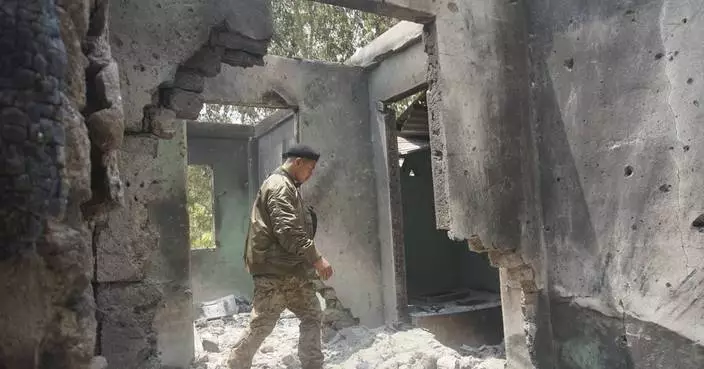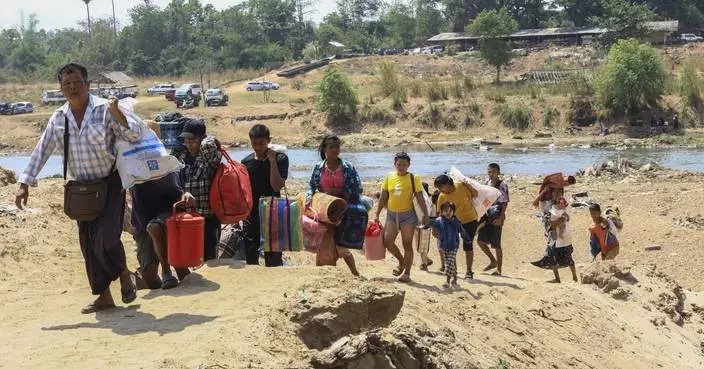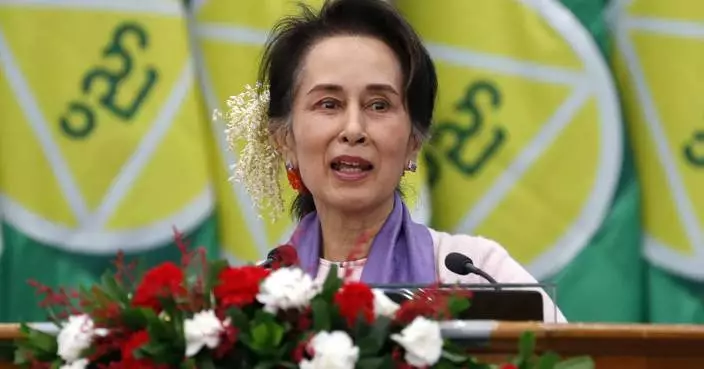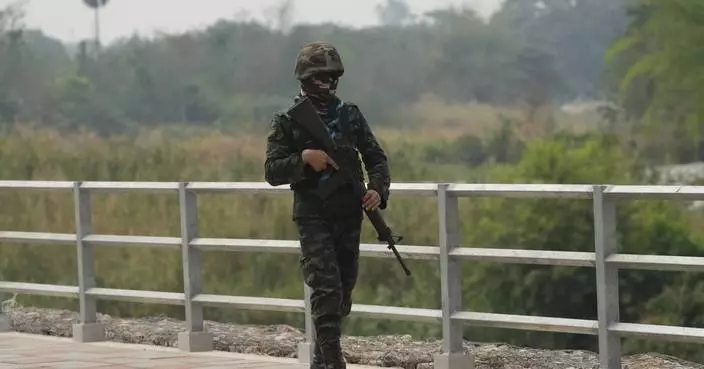After a mass exodus of Rohingya Muslims sparked allegations of ethnic cleansing, Myanmar leader Aung San Suu Kyi said Tuesday her country does not fear international scrutiny.
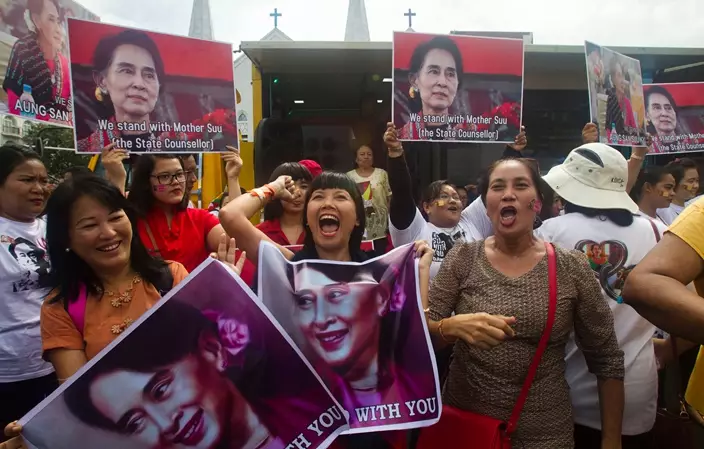
Supporters of Myanmar's State Counsellor Aung San Suu Kyi cheer and dance as they wait to watch live broadcasting of a televised speech to the nation by their leader in front of the city hall in Yangon, Myanmar Tuesday, Sept. 19, 2017. (AP Photo/Thein Zaw)
She told the world that even with an estimated 412,000 Rohingya fleeing to Bangladesh in less than a month as their villages burned and hundreds were killed, the "great majority" of Muslims within the conflict zone stayed and that "more than 50 percent of their villages were intact."
Click to Gallery
After a mass exodus of Rohingya Muslims sparked allegations of ethnic cleansing, Myanmar leader Aung San Suu Kyi said Tuesday her country does not fear international scrutiny.
She told the world that even with an estimated 412,000 Rohingya fleeing to Bangladesh in less than a month as their villages burned and hundreds were killed, the "great majority" of Muslims within the conflict zone stayed and that "more than 50 percent of their villages were intact."
The Nobel Peace laureate's global image has been damaged by violence since Rohingya insurgents attacked Myanmar security forces on Aug. 25. Rohingya fled their villages in the military crackdown that followed. Many of their villages were in flames when they left. The government has blamed the Rohingya themselves, but members of the persecuted minority have said soldiers and Buddhist mobs attacked them.
Suu Kyi told foreign diplomats gathered for her speech in Naypyitaw, the capital, that the government was working to restore normalcy in the area.
"Nevertheless we are concerned to hear that numbers of Muslims are fleeing across the border to Bangladesh," she said. "We want to understand why this exodus is happening. We would like to talk to those who have fled as well as those who have stayed."
She said she it would be helpful to understand why conflict did not break out everywhere. She invited the diplomats with visit villages that weren't affected so they could learn along with the government "why are they not at each other's throats in these particular areas."
In the Kutupalong refugee camp, Abdul Hafiz said Rohingya once trusted Suu Kyi more than the military that not only ruled for half a century before, but also held her under house arrest for many years. Now Hafiz calls Suu Kyi a "liar" and says Rohingya are suffering more than ever.
The Rohingya have had a long and troubled history in Myanmar, where many of the country's 60 million people look on them with disdain.
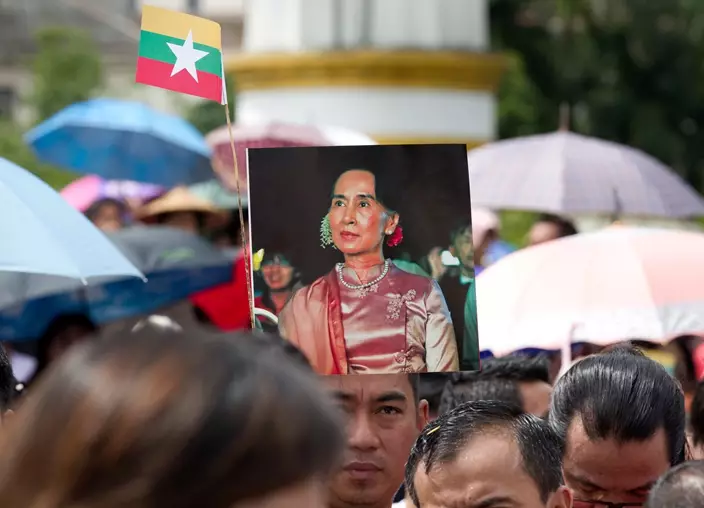
A supporter holds the portrait of Myanmar's State Counsellor Aung San Suu Kyi and Myanmar national flag as he watches live broadcasting of a televised speech to the nation by Suu Kyi, Tuesday, Sept. 19, 2017, in Yangon, Myanmar. (AP Photo/Thein Zaw)
The Nobel Peace laureate's global image has been damaged by violence since Rohingya insurgents attacked Myanmar security forces on Aug. 25. Rohingya fled their villages in the military crackdown that followed. Many of their villages were in flames when they left. The government has blamed the Rohingya themselves, but members of the persecuted minority have said soldiers and Buddhist mobs attacked them.
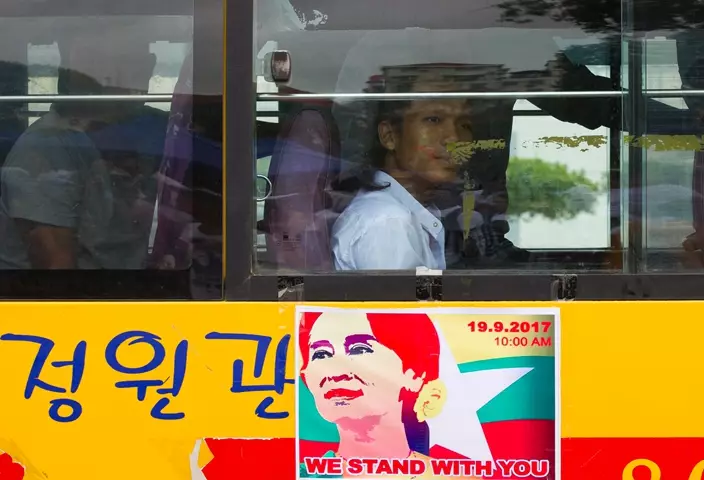
A passenger rides a bus displaying portrait of Myanmar's State Counsellor Aung San Suu Kyi Tuesday, Sept. 19, 2017, in Yangon, Myanmar. (AP Photo/Thein Zaw)
Suu Kyi told foreign diplomats gathered for her speech in Naypyitaw, the capital, that the government was working to restore normalcy in the area.
Though fires have continued to flare in recent days in northern Rakhine state, home to most Rohingya, she said "there have been no armed clashes and there have been no clearance operations" since Sept. 5.
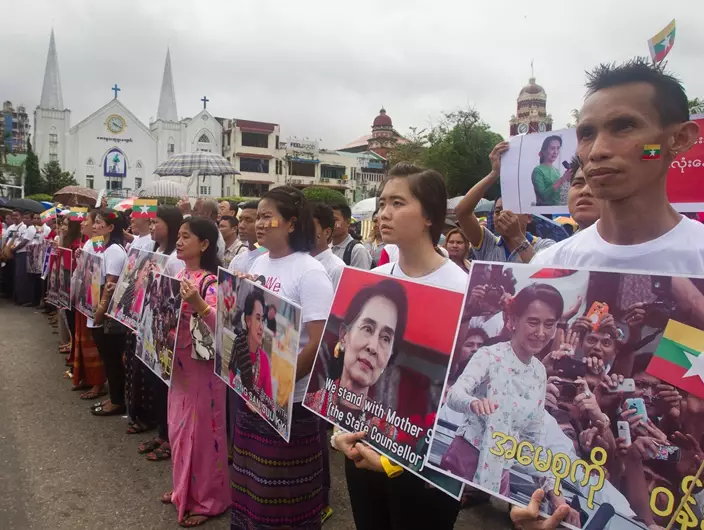
Supporters holding the portraits of Myanmar's State Counsellor Aung San Suu Kyi watch live broadcasting of a televised speech to the nation by her Tuesday, Sept. 19, 2017, in front of the city hall in Yangon, Myanmar.(AP Photo/Thein Zaw)
"Nevertheless we are concerned to hear that numbers of Muslims are fleeing across the border to Bangladesh," she said. "We want to understand why this exodus is happening. We would like to talk to those who have fled as well as those who have stayed."

Myanmar's State Counsellor Aung San Suu Kyi delivers a televised speech to the nation at the Myanmar International Convention Center in Naypyitaw, Myanmar, Tuesday, Sept. 19, 2017. (AP Photo/Aung Shine Oo)
She said she it would be helpful to understand why conflict did not break out everywhere. She invited the diplomats with visit villages that weren't affected so they could learn along with the government "why are they not at each other's throats in these particular areas."
Rohingya now in camps in Bangladesh the implication that Rohingya who were driven from their villages were themselves responsible, or that some members of the ethnic group are safe.
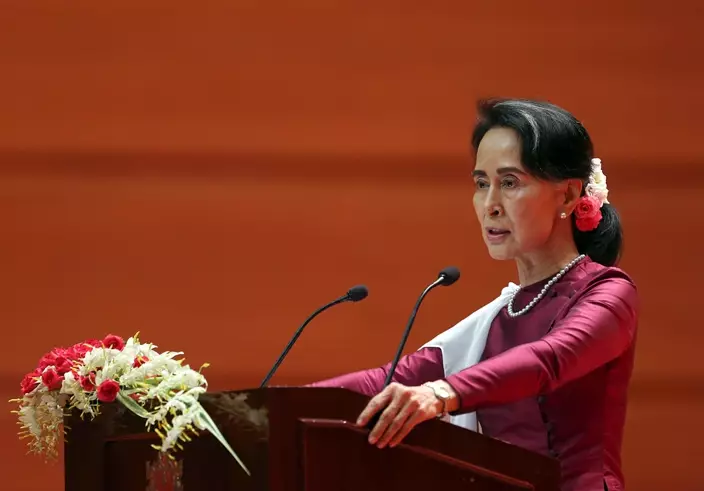
Myanmar's State Counsellor Aung San Suu Kyi delivers a televised speech to the nation at the Myanmar International Convention Center in Naypyitaw, Myanmar, Tuesday, Sept. 19, 2017. (AP Photo)
In the Kutupalong refugee camp, Abdul Hafiz said Rohingya once trusted Suu Kyi more than the military that not only ruled for half a century before, but also held her under house arrest for many years. Now Hafiz calls Suu Kyi a "liar" and says Rohingya are suffering more than ever.
He said Suu Kyi should give international journalists more access to their destroyed villages. If Rohingya are proven wrong that they were attacked, he said, "we will not mind if the world decides to kill us all by pushing us into the sea."
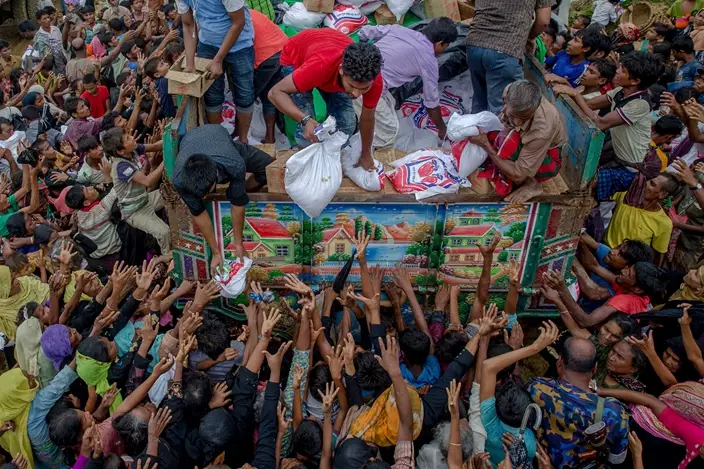
Rohingya Muslims, who crossed over from Myanmar into Bangladesh, stretch their arms out to collect food items distributed by aid agencies near Balukhali refugee camp, Bangladesh, Monday, Sept. 18, 2017. (AP Photo/Dar Yasin)
The Rohingya have had a long and troubled history in Myanmar, where many of the country's 60 million people look on them with disdain.
Though members of the long-persecuted religious minority first arrived generations ago, they were stripped of their citizenship in 1982, denying them almost all rights and rendering them stateless. They cannot travel freely, practice their religion, or work as teachers or doctors, and they have little access to medical care, food or education.
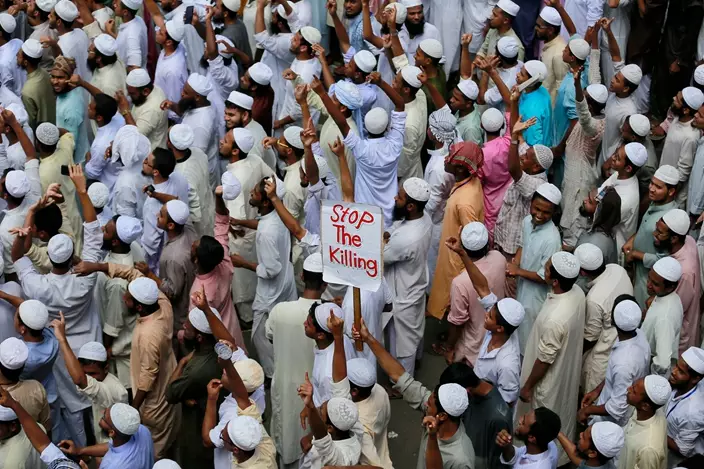
Supporters of the hardline Hefazat-e-Islam gather for a march towards Myanmar Embassy to protest against the persecution of Rohingya Muslims, in Dhaka, Bangladesh, Monday, Sept. 18, 2017. (AP Photo/A.M. Ahad)
Allergy season can bring misery to tens of millions of Americans each year.
Tree, grass, and other pollens can cause runny noses, itchy eyes, coughing and sneezing.
Where you live and what you're allergic to can make a big difference in how bad your allergies are, but there are many things you can do to feel better.
Here are some tips from experts to keep allergies at bay — maybe even enough to allow you to enjoy the outdoors.
There are three main types of pollen. Earlier in the spring, tree pollen is the main culprit. After that grasses pollinate, followed by weeds in the late summer and early fall.
Some of the most common tree pollens that cause allergies include birch, cedar, cottonwood, maple, elm, oak and walnut, according to the Asthma and Allergy Foundation of America. Grasses that cause symptoms include Bermuda, Johnson, rye and Kentucky bluegrass.
The best and first step to controlling allergies is avoiding exposure. That’s easier said than done when it's nice out.
Start with keeping your windows closed at home and in the car, avoiding going out when pollen counts are highest and changing clothes when you get home. The same masks that got us through the pandemic can protect you from allergies — though they won't help with eye symptoms.
Pollen trackers can help with planning. The American Academy of Allergy Asthma and Immunology tracks levels through a network of counting stations across the U.S. Counts are available at its website and via email.
You can't fight an enemy you don't know.
Since many Americans are allergic to several things at once, the first thing to figure out is what specifically you’re allergic to, said Dr. Nana Mireku, an allergist in the Dallas-Fort Worth area.
Over-the-counter nasal sprays can help relieve symptoms, but they take a while to kick in, so it’s best to start them in early in the season, said Dr. Rachna Shah, an allergist and director of the Loyola Medicine Allergy Count.
Antihistamines are another option. Shah said she’s seen some patients benefit from switching to a similar brand if one stops working, but said that there isn’t much broader data to back the recommendation.
For young children and people who have to take many different allergy medications, immunotherapies in the form of shots and oral drops can help desensitize the immune system to allergens, treating symptoms at their root.
The Asthma and Allergy Foundation of America issues an annual ranking of the most challenging cities to live in if you have allergies, based on over-the-counter medicine use, pollen counts and the number of available allergy specialists. This year, the top five were Wichita, Kansas; Virginia Beach, Virginia; Greenville, South Carolina; Dallas; and Oklahoma City.
If you've been thinking it started earlier and seems longer this year, you're on to something.
Shah usually starts looking at pollen counts in the Chicago area in April. But this year, she peeked at her data in mid-February, and tree pollen was already at a “moderate” level.
“This season has been so nuts,” she said. “Granted, it was a pretty mild winter, but I didn’t expect it to be so early.”
Shah said she believes this season will be longer than other years, assuming the weather remains warm.
Experts say climate change has led to longer and more intense allergy seasons.
The Associated Press Health and Science Department receives support from the Robert Wood Johnson Foundation. The AP is solely responsible for all content.
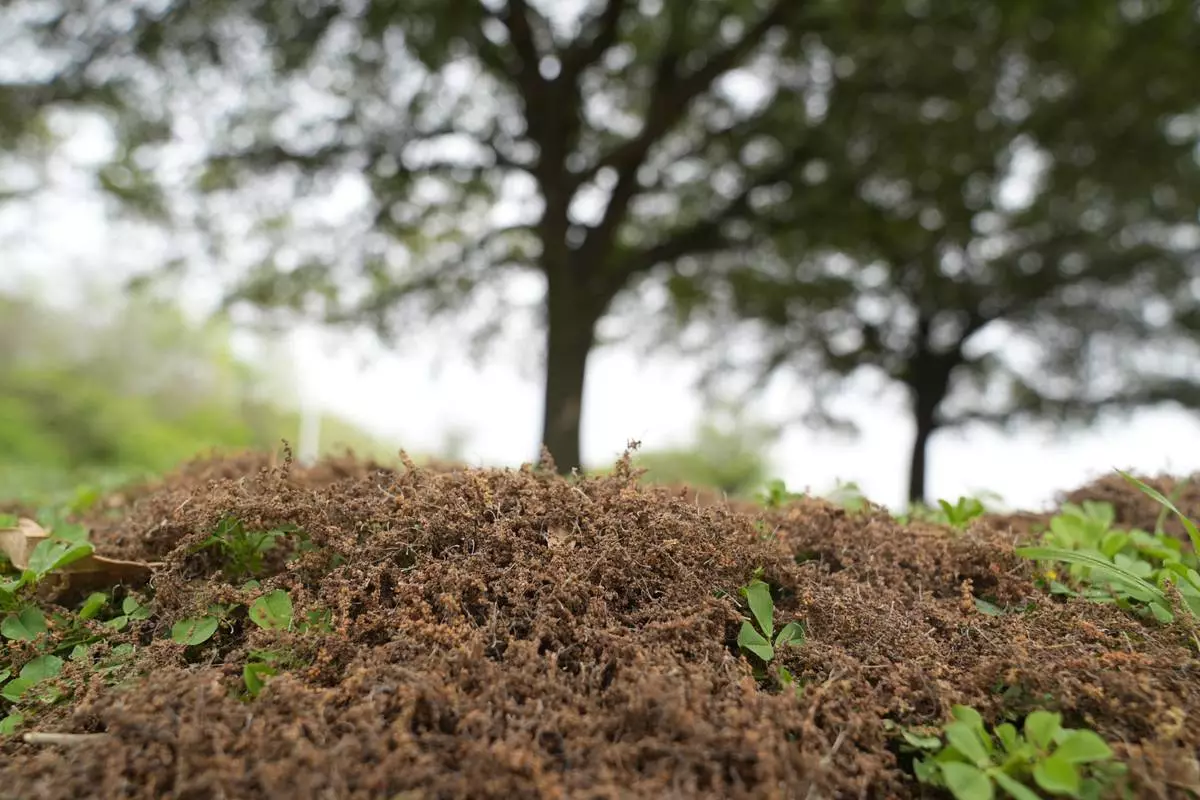
FILE - Tree pollen pods lay in a pile at a park in the Dallas suburb of Richardson, Texas, Thursday, March 21, 2024. The Asthma and Allergy Foundation of America issues an annual ranking of the most challenging cities to live in if you have allergies, based on over-the-counter medicine use, pollen counts and the number of available allergy specialists. In 2024, the top five were Wichita, Kansas; Virginia Beach, Virginia; Greenville, South Carolina; Dallas; and Oklahoma City. (AP Photo/LM Otero, File)
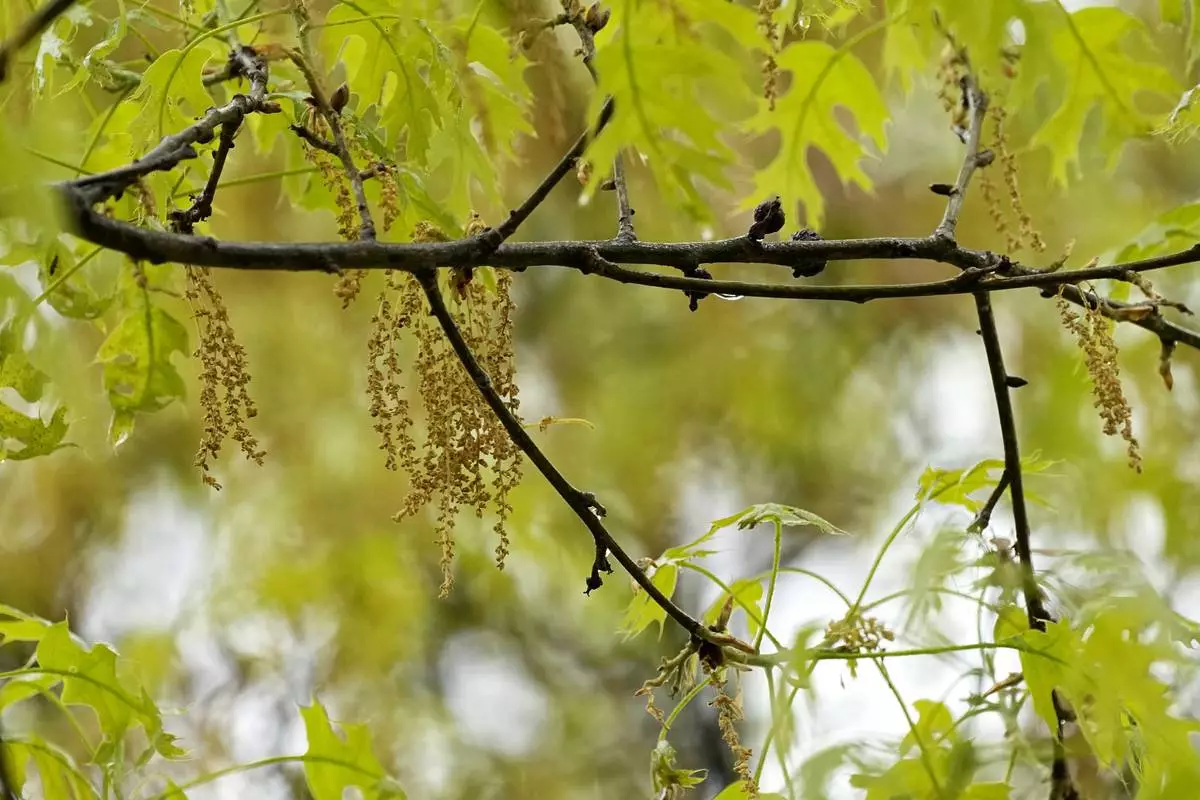
FILE - An oak tree with new leaf growth also shows pollen and a drop of water hanging among the branches at a park in Richardson, Texas, Thursday, March 21, 2024. There are three main types of pollen. Earlier in the spring, tree pollen is the main culprit. After that grasses pollinate, followed by weeds in the late summer and early fall. (AP Photo/Tony Gutierrez, File)













